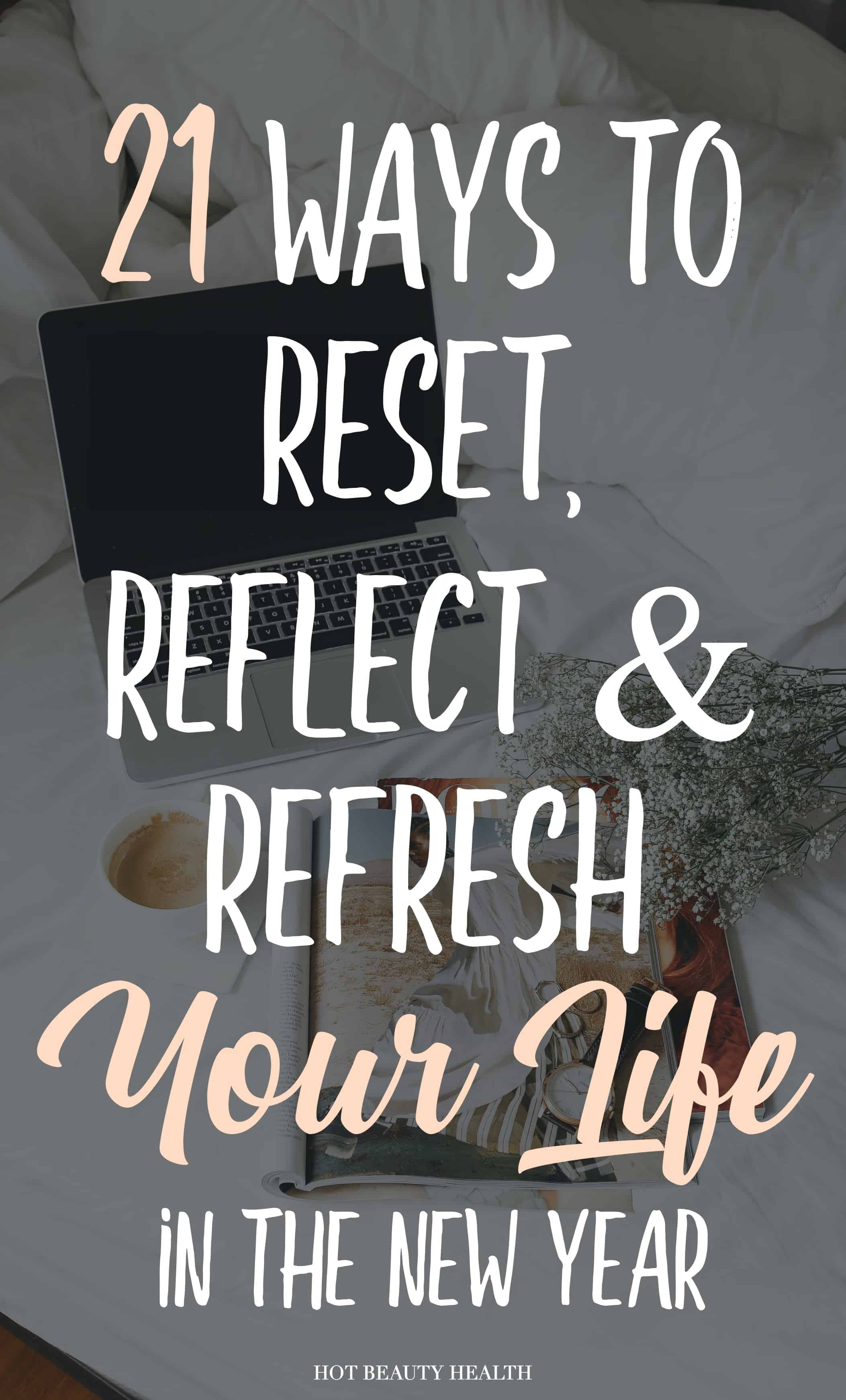How To Reset, Reflect, & Refresh For The New Year

The start of a new year means new beginnings, new goals, and reflecting on the one just passed. As some people get overwhelmed by the potential pressure of starting a new year, it is a good mindful approach to break the process down into some positive sustainable steps.
Hitting your reset button and simplification can be a powerful and rewarding process. Most of us have experienced the call of reflection. While we are often cautioned against the dangers of living in the past, reflecting in a positive way is a means to the end of learning from your experiences. The process of refreshing refers to the positivity that can come form prioritizing and being mindful of your choices. A combination of these processes can help you focus and reach your goals from the inside out.
Here are ways you can reset, reflect and refresh for the new year!
Hit Your Reset Button

I love applying technological terms like ‘reset’ to the human experience because, let’s face it, most of us are so connected to the digital world that these terms have become almost universal. Hitting your reset button involves the mind-body internal-external connection and how simplifying your life can equate to a quieter and more contented inner self.
1. Do Some Decluttering
There is a huge decluttering movement on the winds these days, and there is good reason for it. Psychologists point out that there is a strong correlation between living in physical clutter and the mental clutter that leads to feelings of stress and anxiety. You need mental space to be your best self. You need a soft place to come back to after a long day. A home doesn’t need to be large, perfect, or professionally decorated, but studies have shown that a home free of clutter has happier and healthier inhabitants.
2. Determine What to Let Go of
The step of determining what to let go of goes hand in hand with decluttering. I would advise going room by room and creating three piles. One pile for “keeps,” another for “donating,” and another for “garbage.”
READ: 11 Things To Let Go Of In Your 20s
When considering an item, ask yourself two questions: “Does this item add value to my life?” and “Have I used this item in the last year?” Answer the questions honestly and sort accordingly. The process will be addictive, and once you see the results in one space, you will be inspired to continue. When it comes to sentimental attachments to belongings of loved ones, remind yourself that whether or not you have all their items, you still have all your memories. Choose one item to represent a precious memory or individual and move on from the rest.
3. Give Your Fridge and Pantry a Healthy Makeover
Giving your fridge and pantry a healthy makeover is a great place to start taking steps towards a healthier body. Getting rid of kitchen clutter and processed junky food items and replacing them with healthier options can have great affects on your mind and body. A simple change such as removing juice and pop and replacing it with water can have a huge impact on your health and wellness.
4. Simplify Your Life
Everyone has complexities in their life, and although not all those complexities can simply be removed, you can examine your life and decide what is draining your energy with little pay-back. When it comes to simplifying, look at the largest areas of your life that you find draining and ask what you can truly minimize or give up. Often, just removing one thing, even for a time until things slow down, can have big emotional affects. Simplifying involves putting your time and energy where it needs and deserves to be. If you are putting too much into other things that are draining, it is time to simplify and start trimming the fat.
READ: 19 Simple Ways To Simplify Your Life
5. Recharge Your Batteries
In a culture that seems to worship being busy and equates a hectic schedule with success, it is easy to forget to recharge your batteries. It is a trap to fall into the belief that needing to recharge is weak and wastes time. Studies have shown that taking some time each day to recharge actually improves productivity. What you need to do to recharge differs from person to person. For some, it’s as simple as taking a few moments for some deep-breathing exercises; for others, it means shutting off the screens and reading a good book for a half-hour. Find your best recharge and try and cultivate it into your daily routine.
6. Adjust Your Behaviors
Our behaviors tend to define us. What you do and how you react to things feeds into feelings of self worth and perception. Adjusting your behaviors, even the smaller ones, can have big results in the areas of health and wellness. You can’t change who you are, but simple behavior adjustments can have a powerful impact on how you react to challenges and triumphs throughout life.
Reflect On Last Year

Reflection is a powerful tool; through it, you can learn from your experiences and analyze your patterns. Awareness is the first step towards change, and reflecting on your last year can help you move forward in a positive way.
7. Jot Down Your Top 3 Moments
Another huge movement of today is the power of journaling. Writing down your feelings and experiences can have powerful cathartic effects. Choosing to focus on the positive moments of your last year by writing them down is a positive way of reinforcing those inspiring emotions and events. Reliving those high points can be a powerful motivator as you hope to experience many more such moments in the upcoming year.
8. Jot Down Your Hardest 3 Moments
Many people make the mistake of discounting the value of negative experiences. To many, they are something to move on from and never look back to. To ignore the hard moments is to ignore the lessons that you can learn from them, and let’s face it, adversity and survival does make you stronger. Instead of blocking out those hard moments, embrace them. Write them down so you have power over them, instead of the other way around.
9. Reflect on Your Goals
Consider this time last year and the goals you set for yourself. Now that the year has passed, think about those goals and ask yourself if you reached them and how you want to improve upon them moving forward. Goals are empowering benchmarks. Having something positive to reflect on and move towards gives you a reason to keep pushing forward.
READ: How To Plan Your Best Year Ever
10. Reflect on Your Productivity
Be truthful with this step. Reflecting on your productivity is a great way to truly gauge your discipline. Do you feel like you do something productive each and every day? Even the smallest steps towards productivity contribute significantly to feelings of self-worth and motivation. Productivity experts tout the benefit of making your bed every morning. Even such a small, simple, fast act of productivity can get your day off to a good start and inspire a positive mental affect that carries on throughout the day.
READ: How To Use A Planner Effectively To Boost Productivity
11. Jot Down Your Biggest Lessons from Last year
What were the things that surprised you the most from last year and what did you learn from them? Write those things down and read them back to yourself. This process helps ensure that you have sucked all the marrow out of the lesson, enabling you to learn from it and apply it to any relevant areas of your life. Your biggest lessons can be some of the best or the hardest moments from last year, but what is important is that you glean something from them.
12. Reflect on Your Relationships and How to Improve Them
People need people. The connections you make throughout the year and your life should be authentic ones. Connections that are based on positive emotions and experiences are powerful anchors in life. When it comes to relationships, it should be more about quality than quantity. Reflecting on your relationships and how to improve them can be a fabulous mental investment, one you might benefit from for the rest of your life.
13. Reflect on How You’ve Managed Self-Care
The process of self-care is often the biggest challenge for many people. Sometimes it seems like we are hardwired to think that the more we do and the more we help other people, the better person it makes us. The truth of the matter is that you have to look after yourself first to be able to truly be present for others in your life. Ask yourself how you’ve cultivated the process of self-care and don’t accept vague answers from yourself; if you cannot come up with some concrete examples of how you practice self-care on a daily basis, you need to come up with a simple idea to start with and execute it.
Refresh for the New Year

After you have completed the above steps and have reset and reflected, it is time to refresh. Hit that mental arrow and watch it go around and around until it reloads. Refreshing involves taking all the information, experiences, and reflections of last year and actually applying them to your daily life.
14. Set Massive Long-Term Goals
Having long-term goals is the remedy to lethargy and complacency. Having something to strive for is a powerful motivator and can give you feelings of meaning, purpose, and accomplishment. Setting large-scale goals puts something on the horizon that you can work towards in a positive way
15. Practice Self-Care Rituals Often
Remember reflecting on those self-care rituals of last year? Now, it’s time to put them into practice again, and perhaps build upon them. The best advice regarding how to cultivate self-care is to treat yourself like your best friend. Think of advice you would give a person that is special to you and give yourself that same advice. Treat yourself with gentle compassion, and whatever rituals it takes for you to get there, make sure they are sustainable and practiced on a daily basis.
READ: How Much Time Do You Spend On Daily Self Care?
16. Make a List of People You Want to Cultivate Friendships With
Friendships often come and go throughout life. Some you thought you would have forever fade away, while new connections excite and surprise you. Don’t be afraid to pursue a friendship that you find enticing. If you are feeling that connection with someone, it’s likely they are feeling it to. Make a list of any individuals you feel a strong connection with and want to build upon that connection with. Putting yourself out there can be difficult for some, but making that list can help you widdle down your efforts and truly focus on who is deserving of your time and energy.
17. Make a List of Roles/Responsibilities you Will Honor
Making a list of roles and responsibilities you plan to honor is prioritizing at its finest. You can’t be everyone to everybody, not even close. Being proactive about your roles and consciously deciding which roles and responsibilities are the most important to you will help you weed out the ones that are taking out more than they are putting in. Fulfilling roles and responsibilities can be tiring, but ultimately, you should feel proud of the ones you fulfill, and the ones that don’t bring you those feelings of pride and accomplishment should be eliminated.
18. Create a Better Daily Routine
Time management is an underrated life skill. People without time management skills often suffer from lack of productivity and poor organization in multiple life areas. Creating a better daily routine can trickle into all areas of health and wellness. From getting a proper rest at night to making your bed in the morning and adding some exercise, a better daily routine will help meet your priorities and should reflect what’s most important to you.
19. Make a List of Things You Can Actually Make Time For
Sit down and ask yourself what things/rituals/experiences are most lacking from your life. There are only so many hours in the day and so much energy to go around, but if there are aspects of life you feel you are missing, consider which ones you are capable of integrating into your life. If you legitimately have the time to cultivate these missing aspects, making a list can help turn them into a reality.
Being mindful of the time you have available and making sure that you actually have the time for something before you commit to it seems like a simple thing, but consider the consequences: you make a commitment, can’t keep up, and then have the stress and guilt of trying to back-paddle out of it. Making a list of your time constraints and the things you want to add can help you avoid the stress of having to remove yourself from a role you have committed to prematurely.
20. Start a Gratitude Journal
Oprah Winfrey hit the nail on the head all those years ago when she starting touting the benefits of keeping a gratitude journal. Perspective is a powerful thing. You can have all the money and advantages in the world, but there will always be someone who is better off, higher up, or happier than you.
Happiness is largely dependent upon how you see the world. That is why money alone cannot bring happiness. Starting a gratitude journal is a small act that can remind you daily of the things and people you have in your life that help provide it with meaning, depth, and happiness. Focusing on the things in life to be grateful for is a positive remedy for letting the challenges get you down. Gratitude journals help retrain the mind away from the detrimental cycle of negativity and help it dwell in the positives.
READ: 7 Small Choices to Make to Stay a Happier Person
21. Book That Vacation You’ve Always Dreamed Of
Life is about experiences. People on their death beds rarely wax poetic about money or possessions; they graze over positive memories, people, and experiences throughout their lives. You work hard for what you have, and booking that vacation you’ve always dreamed of is exactly what you need to do to truly experience the fruits of your labor.
Take the time you need to step back from the hectic daily grind and slow down. Studies have shown that people who take more vacations and travel more are generally happier and more well-adjusted individuals. Vacations are one of the best ways to refresh oneself and help detox the body of stress.

There’s is nothing like a reset button. I find I need to do a detox ahead of it, and I tend to clean my space AFTER I’m clear about my intentions and start/stop goals in order to be more mindful about how I’m creating space for them.